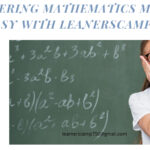Understanding the classification and operations on natural numbers is essential for navigating through mathematical landscapes with confidence and precision. Hence, in the realm of mathematics, natural numbers form the foundation upon which numerical concepts are built. As such, this blog embarks on a journey to explore the classification of natural numbers as odd, even, and prime. Additionally, it delves into practical examples to illustrate their significance, solve word problems, and discuss operations involving these fundamental numerical entities. Therefore, by the end of this exploration, you will emerge equipped with the knowledge and skills to classify numbers, solve problems, and carry out operations with natural numbers effortlessly.
How to Classify and Operate natural numbers made easier
Learnerscamp is a dedicated platform designed to assist learners in comprehensively understanding the field of mathematics and all mathematical operations. Through practical questions and clear explanations, Learnerscamp provides the essential resources to help you grasp the fundamentals of how to classify and operate natural numbers.
Navigating Natural Numbers:
- Understanding Natural Numbers:
Natural numbers, denoted as N, are the set of positive integers starting from 1 and extending infinitely. Equally, they are the fundamental building blocks of our numerical system, forming the basis for various mathematical operations and concepts.
- Classification of Natural Numbers:
- 1. Odd Numbers:
Odd numbers are integers that cannot be divided evenly by 2. Hence, they are characterized by having a remainder of 1 when divided by 2. Examples include 1, 3, 5, 7, and so on.
- 2. Even Numbers:
Even numbers are integers that can be divided evenly by 2. Thus, they are characterized by having no remainder when divided by 2. Examples include 2, 4, 6, 8, and so on.
- 3. Prime Numbers:
Finally, Prime numbers are natural numbers greater than 1 that have exactly two distinct positive divisors: 1 and the number itself. Examples include 2, 3, 5, 7, 11, and so on.

Practical Examples:
- 1. Odd Number Example:
The number 17 is an odd number because when divided by 2, it leaves a remainder of 1.
- 2. Even Number Example:
The number 10 is an even number because it is divisible by 2 without leaving a remainder.
- 3. Prime Number Example:
The number 11 is a prime number because it has exactly two distinct positive divisors: 1 and 11.
Solving Word Problems:
Let’s tackle some word problems involving natural numbers:
- 1. Example 1:
If Sarah has 6 apples and she gives away 3 apples, how many apples does she have left?
Solution: Sarah has 6 – 3 = 3 apples left.
- 2. Example 2:
If there are 12 students in a class and each student has 2 pencils, how many pencils are there in total?
Solution: There are 12 x 2 = 24 pencils in total.
Operations on Natural Numbers:
- 1. Addition:
Adding two or more natural numbers yields a sum. For example, 3 + 5 = 8.
- 2. Subtraction:
Subtracting one natural number from another yields a difference. For example, 8 – 3 = 5.
- 3. Multiplication:
Multiplying two or more natural numbers yields a product. For example, 2 x 4 = 8.
- 4. Division:
Dividing one natural number by another yields a quotient. For example, 8 ÷ 2 = 4.
- Discussion on Even, Odd, and Prime Numbers:
In particular, engage in discussions to solve problems involving even, odd, and prime numbers. Moreover, explore patterns, properties, and relationships between these types of numbers to deepen understanding and enhance problem-solving skills.
Conclusion:
In conclusion, mastering the classification and operations on natural numbers is essential for developing strong mathematical skills and problem-solving abilities. Thus, by understanding the classification of numbers as odd, even, and prime, solving word problems, and carrying out operations with natural numbers, individuals can navigate mathematical challenges with confidence and precision. So, let’s embrace the beauty and power of natural numbers, armed with the knowledge and skills to tackle mathematical concepts with ease and proficiency.
As a result, the next time you encounter a mathematical problem involving natural numbers, remember to classify, solve, and operate with confidence, knowing that you possess the skills to unlock their secrets and unravel mathematical mysteries.




